Why Waterloo Matters
In June 2015, Europe will commemorate the 200th anniversary of the Battle of Waterloo. It was a defining moment in Europe’s history, ending 23 years of war. Waterloo 200 is dedicated, with its partners the National Army Museum and Culture 24, to commemorating this vital event and showing how Waterloo is still relevant today.
It was one of the most important military battles of the 19th century involving at least four armies, 200,000 soldiers, 12,000 dead and 35,000 wounded, with all sides showing a high degree of military leadership, courage and bravery.
For Great Britain, it was the culmination of a long campaign, fought in Portugal, Spain, France and finally in Belgium (as well as in many other parts of the world), involving many nations in a struggle against the tyranny of imposed regimes and for the preservation of personal liberties that had their origin in the Magna Carta.
For France, it marked the end of the momentous revolutionary and Napoleonic periods which spread across Europe the ideas of the French Revolution and extended the influence of France to limits never seen before, but also involved a high degree of despotism and exhausted the population and the economy through almost continuous wars.
For Belgium, it put a definitive end to its annexation by France and confirmed its incorporation into the newly created Kingdom of the Netherlands, from which it would secede in 1830 to become an independent nation.
For Europe, it put an end to a long period of war, instability and change, precipitating a number of useful reforms, but also sowing the seeds of nationalism, which was the origin of many subsequent conflicts; more immediately the outcome of the Battle of Waterloo confirmed the conclusions of the Congress of Vienna, setting a new, more stable balance of power on the continent.
Victor Hugo characterised Waterloo as the “hinge on the door to the 19th Century”. The metaphor signals the importance of the battle, not only heralding a period of sustained peace, but also as the closing event in the first global conflict in which military actions had taken place on sea and land, across Europe, in Russia, Egypt, the Caribbean and North and South America.
Today, the challenges in every sphere of human endeavour – social, economic, political, cultural and spiritual – are no less great than at the time of Waterloo. The will to seek sustainable solutions is preferable to mere settlements, and the imposition of power by whatever means can never triumph over the recognition that the qualities of respect for one another and cooperation in common endeavour will lead us forward in the one enterprise in which we all share – a better world for all mankind.
The 200th anniversary of the Battle of Waterloo provides a unique opportunity to remember the historical significance of this event and how it acted as a catalyst for change. Given the extensive structures which now exist within the European Union, with the profound habit of cooperation and pooling of sovereignty to defend and promote European values and common interests which has developed over the last 60 years among the European peoples, the commemorative themes of multi-national cooperation, European integration and of pan-European security and stability are relevant and timely.
Europe has experienced one of the longest periods of peace and prosperity that the continent has ever known. There is a great opportunity for European countries to put together a coordinated international effort to celebrate this defining moment of history. Without such an approach, the commemorations would be limited to national events and focus principally on the military aspects of the Anniversary.


